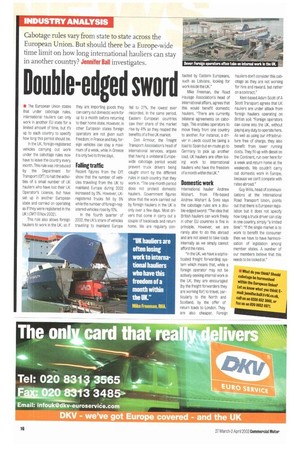Double-edged sword
Page 16

If you've noticed an error in this article please click here to report it so we can fix it.
Cabotage rules vary from state to state across the European Union. But should there be a Europe-wide time limit on how long international hauliers can stay in another country? Jennifer Ball investigates.
• The European Union states that under cabotage rules, international hauliers can only work in another EU state for a limited amount of time, but it's up to each country to specify how long this period should be.
In the UK, foreign-registered vehicles carrying out work under the cabotage rules now have to leave the country every month. This rule was introduced by the Department for Transport ( DfT) to halt the activities of a small number of UK hauliers who have lost their UK Operator's Licence, but have set up in another European state and carried on operating as if they were registered in the UK ( CM7-13 Nov 2002).
This rule also allows foreign nauhers to work in the UK, so if they are importing goods they can carry out domestic work for up to a month before returning to their home state. However, in other European states foreign operators are not given such freedom; in France and Italy, foreign vehicles can stay a maximum of a week, while in Greece it is only two to three days.
Falling traffic
Recent figures from the DfT show that the number of vehicles travelling from the UK to mainland Europe during 2002 increased by 5%. However, UKregistered trucks fell by 5% while the number of foreign-registered vehicles rose by 10%.
In the fourth quarter of 2002, the UK's share of vehicles travelling to mainland Europe fell to 27%, the lowest ever recorded. In the same period, Eastern European countries saw their share of the market rise by 41% as they reaped the benefits of a free UK market.
Don Armour, the Freight Transport Association's head of international services, argues that having a unilateral Europewide cabotage period would prevent truck drivers being caught short by the different rules in each country that they work in. "The one-month period does not protect domestic hauliers. Government figures show that the work carried out by foreign hauliers in the UK is only over a few days. Most drivers that come in carry out a couple of backloads and return home. We are regularly con tacted by Eastern Europeans, such as Latvians, looking for work inside the UK."
Mike Freeman, the Road Haulage Association's head of international affairs, agrees that this would benefit domestic hauliers. "There are currently bilateral agreements on cabotage. This enables operators to move freely from one country to another. For instance, a driver in Leeds could be taking a load to Spain but en-route go to Germany to pick up another load. UK hauliers are often losing work to international hauliers who have the freedom of a month within the UK."
Domestic work
International haulier Andrew Wishart, from Fife-based Andrew Wishart & Sons says the cabotage rules are a double-edged sword: "The idea that British hauliers can work freely in other EU countries is fine in principle. However, we are rarely able to do this abroad and are not asked to take loads internally as we simply cannot afford the rates.
"In the UK, we have a sophisticated freight forwarding system which means that, while a foreign operator may not be actively seeking internal work in the UK, they are encouraged (by the freight forwarders they are working for] to travel, particularly to the North and Scotland, by the offer of return loads to London. They are also cheaper. Foreign hauliers don't consider this cabotage as they are not working for hire and reward, but rather on a contract."
Kent-based Adam Scott of A Scott Transport agrees that UK hauliers are under attack from foreign hauliers operating on British soil: "Foreign operators can come into the UK, without paying any duty to operate here. As well as using our infrastructure free of charge, they also benefit from lower running costs. They fill up with diesel on the Continent, run over here for a week and return home at the weekends. We couldn't carry Out domestic work in Europe, because we can't compete with rates abroad."
Guy Willis, head of communications at the International Road Transport Union, points out that there is European legislation but it does not specify how long a truck driver can stay in one country simply "a limited time": "if the single market is to work to benefit the consumer then we have to have harmonisation of legislation among member states. A number of our members believe that this needs to be looked at."












































































































































































